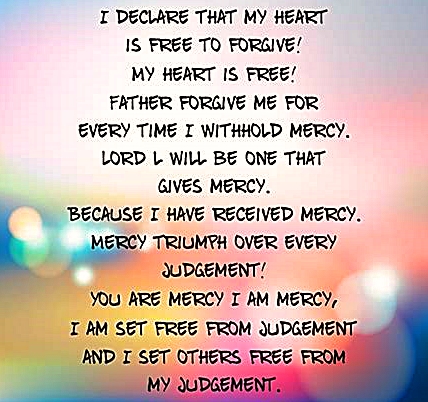Unconditional Love – BT16

The forgiveness of unconditional-love versus judgment
Please follow the BLOG Etiquette to stay on topic and pass the moderator’s check. Bold, underlined text below = future links to the BLOG pages.
Forgiveness of sins is 23% of the Matthew 6:9-14 and 38% of Luke 11:2-4 “Lord’s Prayer” and in Matthew’s account Jesus immediately adds vv. 15-16 to teach more about it! Mark 11:24-25 links forgiveness to answered prayer. Matthew 6:14-15, 35 and Luke 6:37 links our forgiveness with forgiving others. So you can that forgiveness is NOT a side issue but at the CORE of how God’s “kingdom comes and will is done on earth as it is in heaven” AND directly coupled by the use of kai to “in possibility not being eisphero lead-or-brought-unto-the-result-of peirasmos [singular] testing/trying-to-prove-our-genuineness” and in Matthew’s account “but-instead deliver us away-from [singular] evil [one].” Satan is the “accuser of the brethren” per Revelation 12:10, and we will see he uses the Law to do it!
Forgiveness is integral to the unconditional-love God gave to us under a completely-different-in-kind New Covenant by Christ’s blood, so naturally it is the CORE of Christ’s gospel logos message of salvation (a), especially when the Greek word soteria/soterias for “salvation” is a “process of deliverance, reconciliation, and restoration to healthy wholeness.” Forgiveness is also integral to the unconditional-love Christ officially commands His followers to have: “My completely-different-in-kind-superior kainos New commandment to you is to ongoingly unconditionally-love one another just as I have already unconditionally-loved you. By this all people will experientially, relationally ginosko know that you are My disciples/followers if you ongoingly have unconditional-love for one another” (b). It’s our main witness of Christ! <Notes> a) Matthew 9:6, 26:28; Mark 2:10; Luke 5:24, 24:47; Acts 2:38, 5:31-32, 10:43, 13:38, 26:18; Romans 4:7; Colossians 1:14; Hebrews 9:22, b) John 13:34-35, 15:12.
Unforgiveness by holding onto our ‘accusing’ criticisms/judgments (krino) of others is condemned by the NT because it not only puts ourselves above God’s Law by becoming judges of others when there is only One Judge (a), but it hypocritically demands for/from others what we don’t want for ourselves – absolute justice ‘payback’ retribution for sin. We want unmerited, unearned, undeserved agape unconditional-love and unconditional-loving-favor-of-grace shown to US through Christ’s sacrificial unconditional-love (b) in order to be freed from the “singular righteous requirement of the Law” (c) of perfect obedience to all 613 commandments, yet we don’t want to show these things to others (d). Unforgiveness has always been contrary to God’s nature of Unconditional-Love (e) and thus grieves the Holy Spirit (f). It keeps us umbilically “tethered to” the Law that empowers sin (g) and to the Law that has “bound” us (h), still “burdened or heavy laden” (i) by it, and still “under the dominion” (j) of “the Law of sin and death” (k). Thus unforgiveness blocks God’s “will being done” and God’s “kingdom of . . . righteousness, joy, and peace by the means of the Holy Spirit” (l) from “coming on earth as it is in heaven.” That’s why forgiveness is key to the Lord’s Prayer model. <Notes> a) James 4:11-12, b) 2 Corinthians 13:14; 2 Thessalonians 2:16; 1 Timothy 1:14; 2 John 1:3, c) Romans 8:4, d) Matthew 18:21-35, e) Exodus 34:5-7; Numbers 14:18-19; Nehemiah 9:17; Psalms 86:5; Luke 7:47, f) Ephesians 4:30-32, g) 1 Corinthians 15:56, h) Romans 7:2, i) Matthew 11:30, j) Romans 6:14, k) Romans 8:2, l) Romans 14:17.
Even from a medical viewpoint, much has been written about the detrimental results of holding onto judgment and unforgiveness. Holding onto “resentment, the enormous burden of being hurt and disappointed” according to Dr. Karen Swartz, director of the Mood Disorders Adult consultation Clinic at John Hopkins hospital, increases the risk of heart attacks, elevated cholesterol levels, higher blood pressure and diabetes, more chances of a brain hemorrhage, worsening sleep, greater anxiety and depression, anorexia, bulimia, and increased stress and pain levels. It includes a wide range of social problems such as negativity, short-temperament, lack of trust, and paranoia. All of this and more is greatly alleviated through unforgiveness. Can you see why Jesus makes 23-38% of His prayer model and so much elsewhere in His teaching about this, especially since the definition of “salvation” includes “restoration to healthy wholeness?”
The one thing I noticed about the world’s methods of achieving this is that they only deal with mechanisms or techniques to cope with symptoms instead of going to the root of the problem. If they do suggest “bringing it into the light through confession” or “sending away the offense,” they do this with a ‘magic wand’ to an unspecified or nebulous location, like the way the New-Age confesses and sends it back into the impersonal “Universe.” They also rely on the patient’s decisive will-power to do this without acknowledging the inherit weakness of man that caused the problem in the first place.
Contrastingly, Jesus correctly declares: “the flesh is absolutely asthenes and opheleo ‘inherently weak, feeble, impotent, worthless, useless, and a complete failure” (a). Trimming dead leaves off a plant that has a sickness affecting its roots doesn’t really fix the plant – the symptoms are bound to show up again or morph into some other problem. Only the Maker knows how we function best; only the Master Vinedresser or Gardener (b) knows how to cure the root problem with the enabling-power of His Holy Spirit. That’s why I did this study – to find out exactly what He says about ‘judgment’ and how He cures it with ‘forgiveness’ by His Spirit’s enabling-power. I’ve got my own baggage to deal with! <Notes> a) Matthew 26:41; John 6:63, b) John 15:1; Luke 13:7.
I’ve also found that many people misquote their bibles by taking things out of context or not understanding the original languages, building doctrines around what the bible did NOT really say. Therefore, I’ve studied every NT verse on the subject and carefully translated from the Greek, especially from their context – see Bible Info. If you are interested in an exhaustive 29 page study on this topic with all the bible references, language study, and historical proofs, contact me from the Contact Us page. Let’s ‘unpack’ this in the following BLOGs.
Reflection:
As Christian musicians, don’t we want our ministry to reflect 1/4 to 1/3 of Christ’s prayer priorities for “His kingdom to come and will to be done on earth as it is in heaven” and reflect the core of the gospel logos message for ourselves and for the world? It’s even integral to the definition of salvation – reconciliation and restoration of health! Don’t we want forgiveness and unconditional-love to be our dominant witness in the world? Aren’t we being hypocritical to want “fair, equitable, exacting justice to be served” on others for their wrong-doing, especially when against us, but then appeal to God’s unconditional love, mercy, and grace for ourselves despite so many sins of omission and commission? Christ’s completely-different-in-kind, superior commandment “to ongoingly unconditionally-love others, just as I have” far exceeds the OT commandment to “love your neighbor as yourself” that allowed the Jews to “hate their enemies” – see Only 2 Commandments – BT3.
Thus Jesus wisely adds to His commandment to the SAVED – see Logos Word of God – BT16: “just as I have already unconditionally-loved you.” This is our example, not “loving our neighbor as we love ourselves.” John 3:16-18 and Romans 5:10 says the whole world, including us, was already condemned as enemies of God, but God still “so unconditionally-loved the world that He gave His only begotten Son that whoever is routinely having trusting-relying-faith in Him might in possibility not perish.” Thus Jesus never reinforced the OT commandment but actually indicated its insufficiency by teaching much on “unconditionally-loving your enemies” (Matthew 5:43-44; Luke 6:27-35). Judgment and unforgiveness are actually tools of Satan that uses the Law to accuse and condemn us. When we do these same things, we are actually working for the Devil and he ruins our lives in the process. We also act as judges, but there is only One Righteous, Just Judge.
Prayer:
Lord, forgive us for holding onto unforgiveness. Give us Your enabling-power of the Holy Spirit to “let go” of being judges and “let God” be the Just Judge at the end of time. Until then, fill us with Your Unconditional-Love so that we will think and feel the way You do towards ALL men.
Spiritual Education, Unconditional Agape Love, Forgiveness instead of Judgment, Emotional Healing, Living like Christ, 1/4-1/3 of Lord’s Pray is about Forgiveness, Forgiveness is the core of the gospel of unconditional-love, Forgiveness is the reconciliation of salvation, Unforgiveness blocks God’s will and kingdom, Judgment is hypocritical if we want Grace, Unforgiveness will ruin your health, Worldly psychology only treats symptoms, God treats the root problem of sin thru confession


